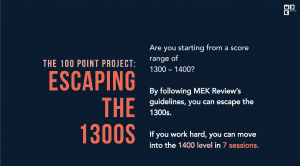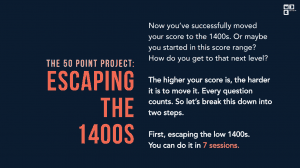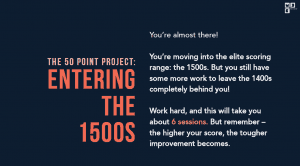
Improving Your SAT Score: The Ultimate Guide
The Ultimate Guide to Improving Your SAT Score
At MEK, we know that improving your SAT score takes hard work, time, and perseverance. But when you find that you are stuck at a certain score, you might be tempted to give up. That’s where MEK can come in to help you take your score to the next level.
Read on to find out expert tips and tricks for getting out of score plateaus, getting the most out of your study sessions, and reaching your goal score!
Escaping the 1200s
Each score range of the SAT reflects a student’s habits, knowledge, and strategies. If you are currently scoring less than a 650 on the Reading & Writing section of the SAT or less than a 1300 for your overall SAT score, the following probably describes you:
Student Character:
You are unfamiliar with the specific skills and knowledge that the SAT is testing.
- The skills and knowledge required to ace the SAT can be very different from school curriculum. Students in this category often have little to no prior familiarity with SAT content. They also lack any set of strategies to tackle the SAT test.
You have undeveloped study habits.
- Students in this category often don’t know how to study for the SAT and/or they lack consistent study habits
How to Escape:
Become familiar with the test: the specific format, the question types, and passage types. You will need to spend time with the test until you understand what topics the SAT is testing.
Writing Section: For the SAT Writing you will need to build your grammar knowledge. The best way to see a quick and significant score jump is to improve grammar mechanics such as punctuation, pronouns, and verbs.
Reading Section: Work on reading comprehension skills. Specifically, you will need to become adept at answering questions that ask you to read closely or find textual evidence. You will need to practice annotating passages to increase your time management and comprehension of passage. You will need to read many practice SAT passages to become familiar with the type of passages and the type of questions.
Learn more effective study habits: Completing practice tests and skill exercises are not enough to see significant score improvement. You have to learn the concepts behind each type of question – not just the answer to the question itself. You have to understand why you picked the wrong answer – not just learn the right answer. In order to understand these concepts, you will have to study your notes, tests, and exercises and develop and practice strategies for the types of questions.
The 7 Session Challenge:
If you are in the 1200-1300 range, MEK recommends 7 sessions to improve your score. MEK provides practice tests, skill exercises, and mini-tests. You will receive instructions from an expert SAT teacher on how to recognize the type of questions. Then, you will be given specific strategies that will yield the correct answer in the most effective way. You will also learn how to increase your mental endurance, have the right mindset toward the exam, and the most effective way to study your materials.
MEK recommends 7 sessions to help you escape the 1200s!
Click here to learn more about our SAT Test Prep.
Escaping the 1300s
If you are currently scoring between 1300-1390 on the SAT, the following probably describes you:
Student Character:
You know the basics.
- Students in this category usually know basic SAT content, have some study habits, and are somewhat familiar with the test format.
You don’t know the best strategies.
- Students in the 1300 range usually don’t know how to approach SAT questions with the most efficient and consistent strategies.
- They often answer questions using a process that takes too long or only leads to the right answer some of the time.
You lack endurance.
- The SAT is a long, mentally exhausting test. Students at this level usually lose focus halfway through the full-length test.
- When there are many difficult questions in a row, these students begin to feel frustrated or discouraged. They often lose motivation or struggle to stay on track.
How to Escape:
Strategies:
You must learn an efficient and proven strategy for ALL questions types on the Reading & Writing section. Remember, you need a strategy that will work every time, no matter which test you are taking. Practice does not make perfect. Perfect practice makes perfect.
Reading Section:
- Build your vocabulary: You can’t get questions right if you don’t understand half the words that are used! Expanding vocabulary will improve your reading comprehension skills.
- Word in Context: Focus on improving your score for Word in Context questions. There are usually around 10 of these questions on the test. So building your vocabulary and learning the correct strategy for tackling this type of questions is the quickest way to improve your reading score.
Writing Section:
- In this score range, you should feel pretty comfortable with standard grammar questions such as punctuation and pronouns. So you need to start focusing on the harder concepts. Most notably, you should work on questions that deal with using language effectively.
- You should learn how to identify a concision (not using too many words or repetitive words) and precision (picking the exact right word) question. Precision is another test topic in which a high level vocabulary will help you find the right answer.
- Furthermore, you should learn the best strategy for answering syntax (how a sentence is structured or an idea is expressed) questions. This is the quickest way to improve your score.
Mindset:
Reaching a new score range is not just about building skills and content knowledge. It is also about correcting any faulty reasoning or ways of thinking that are hindering your performance
- Think like a test maker: You need to shift your mindset to think more like a test maker than a test taker. You need to learn how to identify the intention of each question. The SAT is a very intentional test! Every word in every answer choice is there for a reason. Start figuring out how SAT test makers think, and you will not only improve your score, but you will also become faster at taking the test.
- Identify Weaknesses: You need to identify your key weaknesses in each section. Do you struggle with pronoun or punctuation questions in the Writing section? Are textual evidence or purpose questions from the Reading section your weak point? At this score range, you are probably missing enough questions that you have a pattern in your wrong answers. Figure that pattern out! Once you are able to identify the chinks in your armor, you can aggressively target those weaknesses in your studies in order to improve more quickly.
The 100 Point Project:
By following these guidelines, you can move up to the 1400+ score range within 7 MEK sessions. MEK provides full-length practice tests, mini tests, and vocabulary quizzes. Your MEK instructor will teach you the most efficient and effective strategies, while MEK’s detailed error analysis report will identify your weaknesses. Your instructors will work on building your endurance and improving your mindset.
Escape the 1300s in 7 sessions!
Click here to learn more about our SAT Test Prep.
Escaping the low 1400s
If you are currently in the low 1400s, the following probably describes you:
You are very familiar with SAT content and format.
- Students at this level have taken the test enough to understand how the test is constructed. They have started to recognize certain tendencies in the tests and common “traps” that test makers are leaving for test takers.
You have a strategy, but it’s not perfect.
- Students usually have a strategy to address each question type; however, they do not use that strategy consistently. Sometimes they go back to tackling questions “their way” or picking answers that “seem right” with inconsistent results.
- Some of these students correct answers are due to luck rather than accurate strategy.
- Students at this level tend to overthink certain Reading section questions and sometimes talk themselves out of selecting the correct answer.
- Students have a strong comprehension level of the Reading passages but have a more difficult time determining the larger picture (i.e. main idea, author’s purpose, tone, etc.)
- They struggle with development and organization questions on the Writing section. They also struggle with more complex grammar questions that require an higher level application of the skills they already know.
How to Escape:
Reading Section:
Focus on Context, Repetition, & Key words: This is the key to understanding the larger point of texts – their purpose and central idea.
Passage Type: Target passage types that you consistently struggle with. Historical documents? Older narratives? Texts with a lot of technical jargon? Practice these passages specifically in your studying.
Writing Section:
Development Questions: Remember, the SAT is testing college readiness. Test makers want to know if you can effectively develop an academic essay such as those you will write in college. Make sure you perfect the different strategies for dealing with a variety of development questions. For instance, how should your approach differ for a question that asks you to set up an example in a sentence vs. a question that asks you to provide a logical introduction to a paragraph?
Grammar: Continue to work on grammar questions in a variety of contexts: skills exercises, mini-tests, practice tests, reviewing passages. That way nothing can throw you off! Remember, some grammar questions are testing multiple rules or asking you to apply a rule in a complex way.
Mindset:
Entering a new score is not just about building skills and content knowledge. It is also about correcting any faulty reasoning or ways of thinking that are hindering your performance. In order to escape the low 1400s, you have to change the way in which you think about your performance:
- Wrong Answers: Don’t just determine if you got a question right or wrong, but why you got it right or wrong. Did you get it right because of luck or strategy? Did you get it wrong because of a mistake, lack of knowledge, or incorrect strategy?
- Analyze your test results (or for MEK students, analyze your score report): Hone in on weaknesses – both trends (question types you consistently miss) and outliers (questions you usually get right). Why did you get it wrong?
- Careless Mistakes: Eliminate all careless errors from the Writing section – no punctuation, pronouns, verbs, or other grammar mistakes.
The 50 Point Project:
By following these guidelines, you can move up to the 1450+ score range within 7 MEK sessions. Once you are in the 1450-1490 range, you only have a little further to go to reach the elite status of the 1500-1600 score range.
Click here to learn more about our SAT Test Prep.
Entering the 1500s
If you are scoring in the 1450-1490 range, the following probably describes you:
You are highly familiar with test content and format.
- At this point, you probably feel as if you could make an SAT test.
You only miss a few questions per section.
- These questions do not resemble any type of pattern.
- Your wrong answers generally reflect an error in your thought process about a specific problem or passage rather than a consistent weakness.
- When taking the test, you can usually narrow down difficult questions to the top two answer choices but sometimes pick the wrong answer out of those two.
- Sometimes you miss questions because of careless or silly mistakes.
You are sometimes overconfident in your ability to improve your score.
How to Escape:
Key Questions:
- There are none! At this level, you are not consistently missing any one type of question.
- Why: You MUST focus on WHY you missed a question. Missing only a few questions can make you overconfident in your ability to not make the same mistake on the next test. Instead, you must address the broken strategies or approaches that led you to the wrong answer.
- Careless Mistakes: Silly mistakes do happen. But contrary to popular opinion, you cannot fix this by telling yourself, “I won’t make any careless or silly errors.” Discipline is a result of strategy. Don’t just dismiss an error as careless. Really consider why you made that mistake in the first place.
Mindset:
- Fix your mindset: Students often mistakenly believe that they only have to “get a few more correct” on the next test. This type of thinking breeds a false sense of security. You have to approach the test EVERY TIME with the knowledge that you must get 52 questions right for the Reading and 44 questions right for the Writing – not “a few more.”
- You CANNOT just practice more: Students at this level often feel that they are “almost there,” and if they just practice more – especially if they just practice more with the questions they find difficult – they will improve their score. NOT SO. Practice must be comprehensive – not targeted – at this level. You must practice with a specific mindset and reflect on the practice meaningfully to see any improvement.
- Strategy: Learn the best way to approach a question when stuck between two compelling answer choices. Recognize the “traps” that test makers are creating for you in order to get you to select the wrong answer.
The 50 Point Project:
By following these guidelines, you can move into the 1500-1600 score range within 6 MEK sessions. MEK will provide you with the comprehensive practice and instruction you need to develop the right mindset and reach the top!
Click here to learn more about our SAT Test Prep.
Next Steps
No matter where you are on your SAT journey or what you current score is, MEK wants to help you succeed!
Take the first step in our SAT Prep registration process by taking our in-person or virtual SAT/ACT Practice Test. You’ll receive our detailed score report, along with our expert recommendations for reaching your goal score.
Contact us today to get started!
Related Posts:






